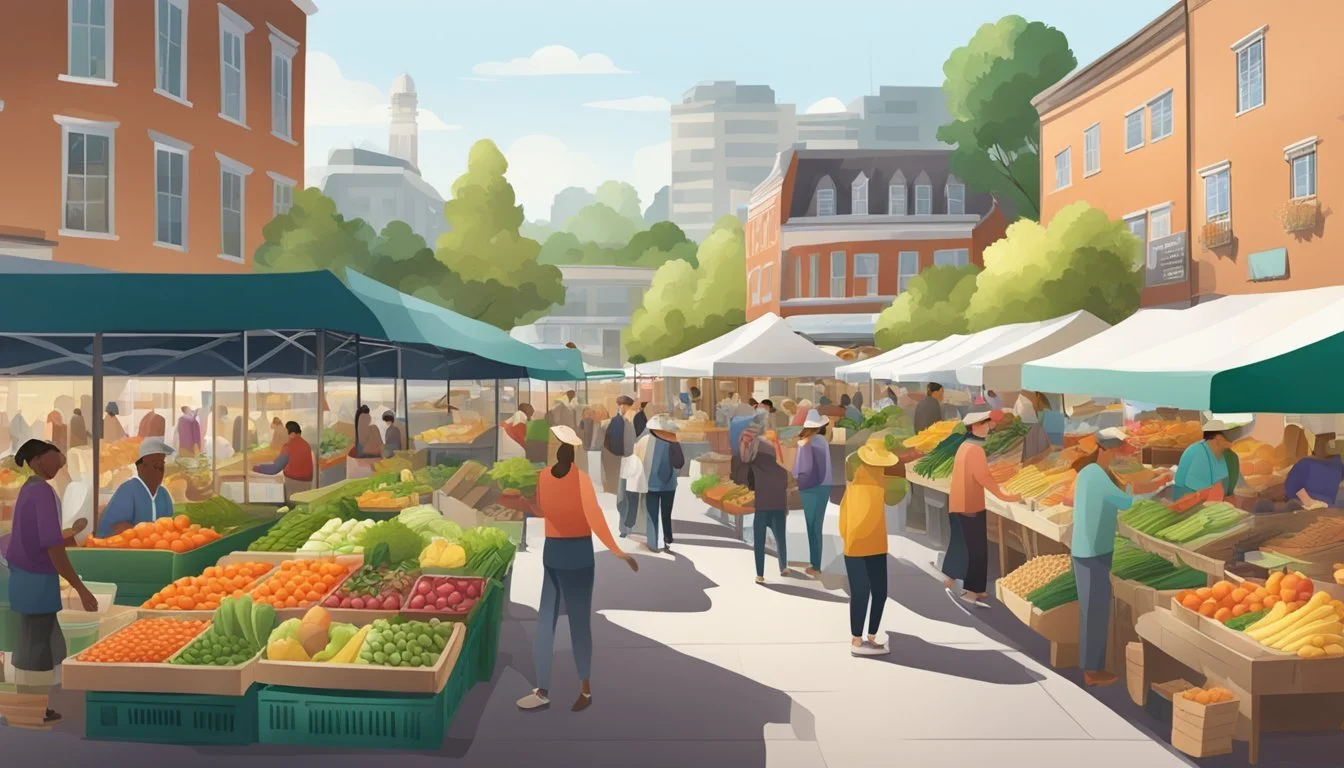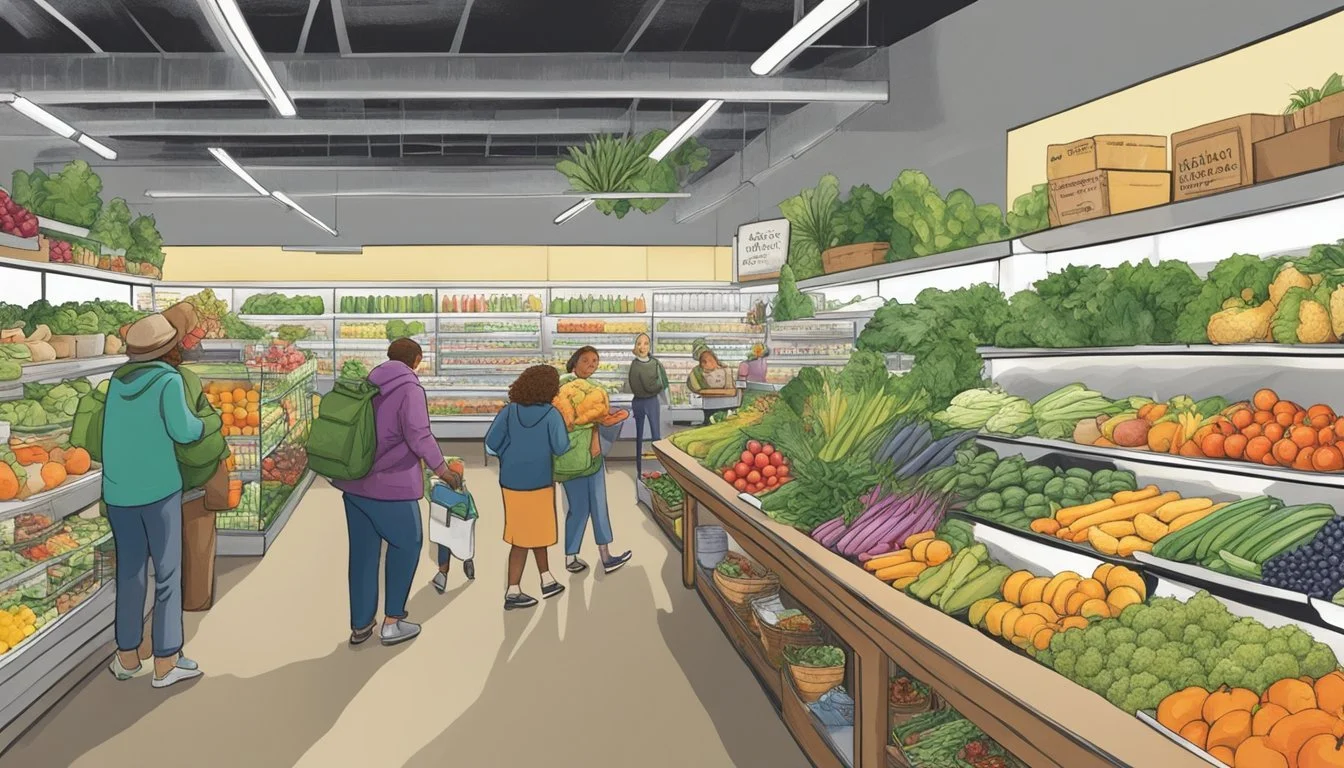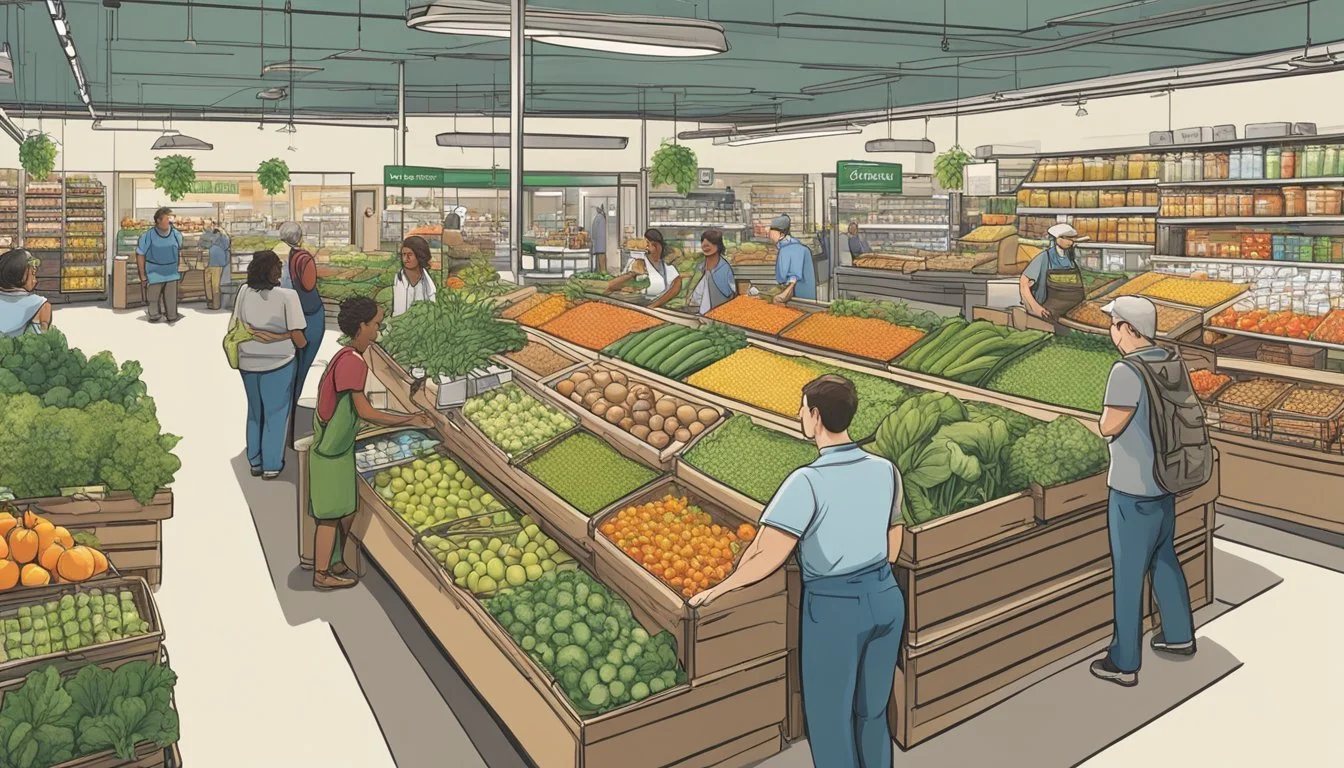Guide to Food Co-Ops in Grand Rapids, MI
Your Access to Local, Fresh Produce
Food cooperatives have garnered significant attention as community-focused alternatives to conventional grocery shopping. They thrive on a business model that prioritizes the community's needs, offering ownership to local members and reinvesting profits back into the Grand Rapids area. As a city with a history of cooperative shopping dating back to 1997, Grand Rapids has experienced a resurgence in this consumer-driven movement, advocating for food choices that support local producers and contribute to a healthier, more sustainable community.
The inception of a new food co-op in Grand Rapids reflects the city's commitment to revitalize this model of food retail. Motivated by the principles of community ownership and access to fresh, local products, the initiative aims to break down barriers to healthy food options and support Michigan’s local farmers and producers. The co-op is envisioned not just as a store, but as a gathering place for those who share a common interest in fostering a robust local food system.
Embracing local sources, the food co-ops of Grand Rapids strive to provide a year-round availability of fresh fruits, vegetables, dairy, eggs, and other locally-sourced cottage products. This effort is not just to create another grocery store; it's an endeavor to reinforce the bonds in the Grand Rapids community through sustainable practices, equitable food access, and active support for the local economy. The co-op movement in Grand Rapids holds the potential to transform the way residents shop for groceries, with a focus on communal well-being and the mutual benefits that arise from a local-centric approach to commerce.
What Are Food Co-Ops?
Food co-ops in Grand Rapids serve as community-owned grocery stores emphasizing the provision of local, organic food options. They are established on principles that prioritize community well-being through support for sustainable practices.
Defining a Co-Op
A food co-op, or cooperative, is a model of grocery store where ownership and decision-making are shared among its members. Typically, one purchases a share to become part owner and is entitled to certain benefits, such as a say in business decisions or a share of profits. These co-ops focus on providing access to high-quality, local food and often support organic and sustainably-sourced products.
History of Co-Ops in Michigan
Michigan has a longstanding history with co-ops, with many established over the years as a response to the community's need for greater access to local, fresh, and organic foods. The formation of food co-ops in the state is marked by community involvement and a shared desire to invest locally, which ensures that consumers have a direct impact on their local food systems and economies.
Benefits of Food Co-Ops
Food Co-ops in Grand Rapids offer a nexus of benefits that center around sustainably supporting the local economy, enhancing community well-being, and providing healthful food options.
Supporting Local Farmers
Local farmers gain a steadfast marketplace through food co-ops. These entities prioritize purchasing from nearby farms, ensuring that consumers have access to fresh produce while simultaneously bolstering the local agricultural economy. By maintaining trade within the community, these co-ops play a pivotal role in sustaining the livelihoods of those who grow food.
Community Impact
A community-owned food co-op serves as more than just a grocery store; it acts as a hub where members have a democratic say in the operations. The profits generated are reinvested into the community, amplifying the co-op's positive influence. They often provide fair, competitive wages and benefits to their local employees, fostering a healthier, stronger community.
Health and Nutrition
Health and nutrition stand at the forefront of food co-ops' offerings, with a focus on healthy, fresh food options, including organic produce. By improving food access, co-ops ensure that nutritious food is available to a broader segment of the community, which is essential for public health and well-being. This commitment to health extends beyond just the products sold, encompassing the very ethos of the co-op.
Joining a Food Co-Op
When an individual joins a food co-op in Grand Rapids, they become more than a customer—they become an integral part of a community endeavor that values accessibility to local and organic products. Membership typically involves purchasing shares, contributing to decision-making, and may offer opportunities to volunteer.
Membership Types
Food co-ops offer various tiers of membership, each with its own set of benefits and responsibilities. Most commonly, individuals can join as:
Regular Members: Pay a basic membership fee, gain access to the co-op's products, and receive voting power on key decisions.
Supporting Members: Contribute at a higher financial level, potentially receiving additional benefits and greater voting power in co-op decisions.
Ownership and Shares
Ownership in a co-op is equated with purchasing shares. These shares represent a member's stake in the co-op and their commitment to its success.
Equity Investment: Typically requires a one-time purchase of a share at a set price.
Share Benefits: Ownership often comes with benefits such as discounts, special order rights, and eligibility to serve on the co-op’s board of directors.
Volunteer Opportunities
Food co-ops thrive on member participation, and volunteering is a cornerstone of many co-ops in Grand Rapids. Members can:
Contribute Time: Offer their skills and time to support day-to-day operations or special events.
Strengthen Community: Volunteering fosters a sense of ownership and community, while also influencing the co-op's direction.
Members are encouraged to stay informed regarding volunteer opportunities and take an active role in contributing to the co-op’s growth and governance.
Grand Rapids Food Co-Op Initiative
The Grand Rapids Food Co-Op Initiative aims to establish a community-owned grocery store, offering local, sustainable options to downtown Grand Rapids residents.
GRFCI Overview
The Grand Rapids Food Co-Op Initiative (GRFCI) is an endeavor to open a cooperative grocery store that will be owned and operated by members of the community. It seeks to offer a variety of local, healthy food choices and support Michigan producers.
Current Status
The initiative is currently in its developmental stages, with ongoing efforts to increase membership and secure funding. Individuals can become owners by purchasing a one-time equity share, with the option for lower-income households to acquire a Food For All share at a reduced cost.
Future Goals
GRFCI's future goals include the completion of the funding phase, with a mix of member equity, community support, and potential lenders to bring the co-op to fruition. Additionally, there is a vision to collaborate with Free Range Food Co-op, enhancing the cooperative food scene in Grand Rapids.
By focusing its efforts on building a strong foundation, the Grand Rapids Food Co-Op Initiative is working towards creating a valuable resource for the community that aligns with the values of sustainability, local sourcing, and member ownership.
Shopping at Food Co-Ops
When shopping at food co-ops in Grand Rapids, MI, customers can expect to find a variety of organic and natural foods that prioritize health and affordability. These community-owned stores offer unique services and goods, with a focus on locally sourced products.
Product Range
Food co-ops in Grand Rapids offer an extensive array of products that cater to health-conscious consumers. They typically stock:
Local produce: A variety of seasonal fruits and vegetables sourced from local growers.
Organic goods: Certified organic items ranging from pantry staples to specialty health foods.
Natural foods: Products free from artificial preservatives, colors, and flavors.
These co-ops often carry unique local artisan goods that may not be available at conventional grocery stores.
Pricing and Affordability
One of the primary goals of food co-ops is to make healthy food accessible and affordable for all members of the community. They achieve this by:
Offering membership benefits, such as discounts on purchases.
Implementing tiered pricing for different income levels; for instance, some co-ops offer reduced membership costs to low-income families to ensure economic inclusivity.
Price comparison with other local stores indicates that while some items may be higher priced due to organic or local sourcing, food co-ops work to keep prices competitive and fair.
Special Programming
Food co-ops provide more than just goods; they foster community growth through special programming, which includes:
Educational workshops on nutrition, sustainable living, and cooking.
Local events to engage with producers and learn about the origin of the food.
Volunteer opportunities that allow community members to play an active role in the co-op's operations.
By participating in these programs, shoppers can develop a deeper connection with their food and the local community.
Community Engagement
The Grand Rapids Food Co-op actively fosters connections with community members by hosting educational workshops and developing outreach programs. These initiatives embody the co-op's commitment to education and aim to reinforce a culture of shared values within Grand Rapids.
Educational Workshops
The Food Co-op holds workshops designed to inform and empower residents about food sourcing, preparation, and nutrition. These sessions provide practical knowledge that underlines the importance of fresh, locally-produced food, reflecting the co-op's educational mission. They facilitate a hands-on learning environment where community members can engage directly with food experts and local producers.
Outreach Programs
Through its outreach efforts, the Food Co-op works to build a network of support for local farmers and food producers. They organize events and programs that encourage community participation and highlight the cultural significance of food co-operatives. The co-op’s outreach is dedicated to ensuring better food access and promoting the values of cooperative ownership and operation.
Co-Op Success Stories
The revitalization of food co-ops in Grand Rapids, MI, underscores a community-driven effort to improve local food accessibility and support local economies.
Linda Jones and the Local Movement
Linda Jones stands as a testament to the power of community advocacy in achieving success for local food co-ops. As co-president of the Grand Rapids Food Co-Op Initiative (GRFCI), she has been instrumental in addressing the grocery needs of Grand Rapids residents, especially in areas underserved by traditional supermarkets. Highlighting the city's growing food culture, Linda Jones's leadership reflects a tangible stride towards establishing accessible food options for all, including low-income households.
Other Michigan Co-Ops
Across Michigan, food co-ops have been exemplifying success in several communities, mirroring the efforts seen in Grand Rapids. These co-ops often provide:
Affordable access to healthy food: They prioritize making food affordable, with programs like Food For All shares priced at $25 for low-income households.
Support for local suppliers and farmers: By sourcing products locally, these co-ops invest back into Michigan’s economy.
Empowerment of local residents: They offer ownership shares, promoting a sense of community and personal investment in the co-op's growth.
Through these initiatives, food co-ops across Michigan are reinforcing the importance of local, community-centered solutions to food accessibility.
Finding and Contacting Co-Ops
When seeking to engage with local food co-ops in Grand Rapids, the primary methods involve consulting a directory for location information and leveraging online resources to connect.
Directory of Local Co-Ops
Grand Rapids Food Coop
Contact: A standard equity share is $250, with a low-income option at $25.
Email: Obtain from the official site or inquiry channels.
Location: Details to be confirmed on the coop’s web presence.
Free Range Food Co-op
Mission: Committed to community well-being, providing access to local, wholesome, organic food.
Email: Available upon registration on their platform or via contact forms.
Additional local co-ops may be found through regional directories or community boards.
Online Presence and Social Media
Grand Rapids Food Coop Initiative
Facebook Page: Acts as a hub for updates, events, and membership information.
Email: Typically listed in the "About" section of the Facebook page or website.
Free Range Food Co-op
They document their journey and share updates via their Facebook page and newsletter, directly engaging their community.
Social Media: A tool they use to create awareness and involvement.
Through email communication or following a Facebook page, interested individuals can stay informed about events, new products, and how to become part owners of the grocery stores. Entities like Meijer generally do not fall within the food co-op category but may sometimes partner with local food initiatives for broader community outreach. It's important for consumers to distinguish between co-ops and standard grocery stores, as co-ops often foster a direct relationship with local food producers.
Operational Aspects of Food Co-Ops
Cooperative grocery stores in Grand Rapids, like food co-ops elsewhere, operate based on a distinctive management structure, a commitment to financial sustainability, and the creation of meaningful employment opportunities.
Management Structure
Food co-ops employ a democratic management structure, emphasizing equality among members who typically have an equal share in ownership. Decision-making processes are collaborative, allowing each member to have a say in important matters. The Grand Rapids Food Co-op Initiative, for example, is governed by a board of directors chosen by its members, ensuring that the community's voice is heard.
Financial Sustainability
Economic stability in a food co-op is achieved through careful management of capital and reinvestment into the coop itself. Membership fees, along with sales revenue, constitute the primary funding sources. This sustainable economic model not only supports the operational costs but also enables profit to be circulated back into local services, providing a robust support system for local producers and the community.
Employment Opportunities
Food co-ops in Grand Rapids offer employment that is aligned with cooperative principles. Employees are typically granted favorable working conditions, fair wages, and sometimes the opportunity to become co-op members themselves, sharing in the governance and potentially benefiting from the co-op's success. This creates an invested workforce that contributes to the quality of service and to the co-op’s overall mission.
Sustainable Practices and Future Trends
Food Co-Ops in Grand Rapids are embedding sustainability in their operations and looking ahead to enhance local food systems. They focus on eco-friendly practices and predicting the waves of change in community-based food distribution.
Eco-Friendly Initiatives
Food cooperatives in Grand Rapids enact sustainable practices through various means. They support locally grown vegetables and products, thereby reducing transportation emissions and ensuring that the food is fresh. This focus on local sourcing also helps to stimulate the regional economy. Members of such co-ops often receive information on how to minimize food waste and adopt sustainable consumption habits.
Eco-friendly initiatives at these co-ops include:
Offering biodegradable or reusable packaging
Implementing energy-efficient lighting and cooling systems in stores
Encouraging vendors to follow sustainable farming practices
The Future of Local Food Co-Ops
The future of food co-ops in Grand Rapids points toward a more centralized role in local food systems. They aim to become hubs for not just the sale of sustainable goods, but also for education about eco-conscious living. Integrating technology can help streamline operations and offer data-driven insights into sustainable procurement.
Looking ahead, local food co-ops will likely increase their collaborations with:
Urban agriculture initiatives
Schools for educational programs on sustainability
Local businesses to expand the distribution of locally sourced food products
With these steps, Grand Rapids food co-ops are poised to be at the forefront of sustainable, community-focused food systems, reflecting the preferences of a consumer base that values transparency, authenticity, and ecological responsibility.










